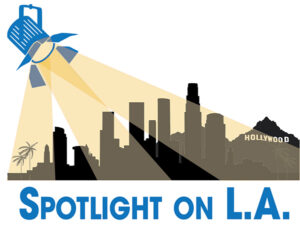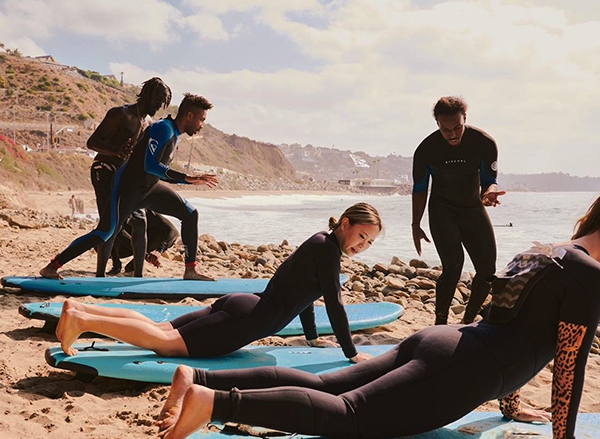By Darlene Donloe
Contributing Writer
On any given day you will find Sahrfilli Matturi in the water doing his favorite pastime — surfing.
He loves to surf every chance he gets, which, when the weather permits, is every day. He considers it a “good thing” that he lives in California where no matter the month or season, he can hang 10 all year surfing somewhere along the vast coastline.
“The West Coast is pretty good for surfing,” Matturi said. “We get waves of two-three feet every day. I’d rank it about 7.5 out of 10. We’re in an ideal location because we can surf year-round.”
When he’s surfing, Matturi, 32, said something enigmatic happens to him. He’s at peace and feels a kind of freedom he’s never experienced before.
It was so satisfying he decided to share his feelings of nirvana with others and launched Sofly Surf School in August 2021.

“I just wanted to share the stoke,” Matturi said. “I wanted to have everybody be introduced to the ocean and feel something different.”
The strikingly handsome Matturi, who was born and raised in Long Beach, said growing up he had to navigate through the urban disparities and find a way to cope with the world around him.
“Surfing has always been my therapy, it keeps my mind and body on an even keel,” he said. “Without the ocean, I honestly don’t know what kind of person I would be but I am grateful for who I am today.”
During the height of the pandemic, Matturi said, “everyone was depressed” but he was “having a great time.”
“I was going to the beach a lot,” said the father of one. “There were not many people of color there. I thought this is my opportunity to share my love of the sport. I was surfing the whole time. There were other surfers in the water. We were distancing because we didn’t know who was sick.”
When a cousin told Matturi she had friends at Cal State Long Beach who wanted to learn how to surf, together they organized a class.
“My cousin had six of her girlfriends come out for a class,” Matturi said. “We got the rental gear and I explained the basics on how to maneuver, how to paddle, how to enter the water, and water safety. I pushed them in the waves. I guess my cousin was recording the class and posted it on Instagram. Everyone thought it was cool.”
Sofly Surf School was born and quickly caught a wave.
The vision of the school is to provide people from underserved backgrounds, especially those of African descent, the opportunity to experience surfing and nature as a way to promote healthy living, spiritual healing and joy.
One goal is to help Black people enjoy the ocean. The other is to provide space for every human being to enjoy what Matturi considers the world’s most abundant resources — water and love — through surfing.
Today, Matturi and his staff teach the fundamentals to classes of between five and 30 participants on Sunset Beach, the northernmost beach in Huntington Beach. He also provides personal coaching. The cost is $120 per lesson, which includes wet suits, boards and anything else participants will need.
In the beginning, participants are only taken into waist-deep water. Most of the class members are women between the ages of 25 and 60.
“Women are a lot more adventurous,” Matturi said. “I travel around to different places and teach small groups. I wanted to create an opportunity for kids who look like me.”
For anyone interested in the sport of surfing, Matturi said they can expect to spend between $200-$400 for a surfboard and $200-$300 for a wet suit.
Matturi bought his first surfboard when he was 15. Prior to that, he was a boogie board enthusiast. After someone ran him over and hit him in the head while he was on his stomach riding a wave, he decided surfing would be his next step.
“I couldn’t believe they didn’t see me,” he said. “I was over it. That’s when I said I’m going to start standing up and not be on my stomach anymore. On my next birthday, I bought a surfboard and taught myself. It took me a good month to learn to stand up. It took me three months to get the whole concept. When you first stand up, it feels amazing. It’s like learning how to walk. A bolt goes off.”
Initially, when Matturi first started bodyboarding, he took to the water like a fish. He soon found himself taking a bus called “Surf Rider” to various beaches, including Seal Beach. He noticed there weren’t a lot of people in the water who looked like him.
“It didn’t bother me but it was like, I guess I’m the only one,” Matturi said. “I grew up skateboarding and only a handful of Blacks were doing [that]. I kept hearing, ‘Oh, you’re doing white people’s stuff.’ When I took up boogie [body] boarding and surfing, I expected to be out there by myself.”
When Matturi first started enjoying water sports, he encountered some pushback.
“White people were disrespectful,” he said. “Some slurs were thrown out. I got a lot of side eyes and racial slurs. It didn’t discourage me. I was addicted.”
Unfortunately, there was racism in the water.
“When they see us, they feel they have the upper hand,” he said. “There is an air about them. Now it’s a little bit better. It’s more accepting. It’s kind of ironic because melanated people invented surfing. It’s not like something we need to be taught.
“We need to remember — this is ours. The first documented surfers were on the West Coast of Africa around 1642. It’s not in our history books, though.”
Sofly Surf School believes that all original people have a deep connection to nature and want to provide an experience that creates a long-lasting relationship between participants and the planet.
In order to break barriers through surfing by getting more Black people in the water, Sofly Surf School partners with the Ebony Beach Club to promote the sport.
The Ebony Beach Club believes “to share the ocean with others is a blessing and aims to uplift each other for the greatness that they all embody both in and out of the water.”
One of the organization’s goals is to send the message to the next generation of Black and brown children that the ocean is a place where they can free their spirits and connect with nature.
“We are teaching more Black people to surf than any other organization,” Matturi said. “With the Ebony Beach Club, we have events once a month on Dockweiler Beach. People can sign up for free surf lessons. There are about 70,000 followers. When we have events, we have about 100 people in the water taking lessons.”
In February, Sofly Surf School and Ebony Beach Club will once again host a peace paddle in Manhattan Beach. The event is held to expose people of color to surfing and to share a message of inclusivity.
“Surfers will go out to the pier and pray and give thanks,” Matturi said.
Matturi said there is more to surfing than just riding the waves.
“There is a huge mental health benefit,” he said. “To be able to reflect on your life and just be in the moment and focus on what you’re doing — or don’t focus at all. Just relax. It’s a stress reliever.
“Being moved by the water, there is some kind of osmosis. It releases something. Even when you get out you feel better. You’re happier. That’s why I want to have people interact and take that in. If you are going through anything, go to the water. It will relieve it.”
“Spotlight on L.A.” is a feature profiling little known places within the city. To propose a location for “Spotlight on L.A.,” send an email to dwanlass@wavepublication.com.
Darlene Donloe is a freelance reporter for Wave Newspapers who covers South Los Angeles. She can be reached at ddonloe@gmail.com.













